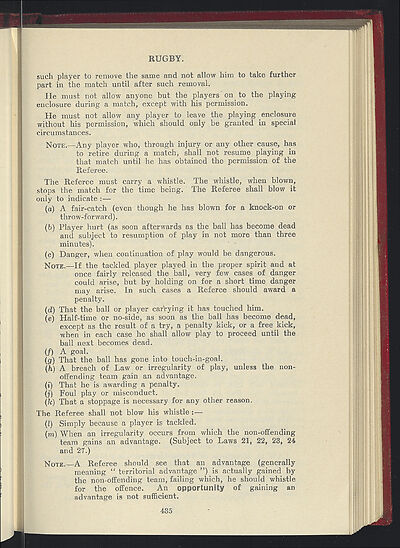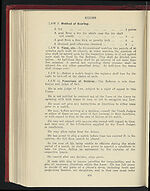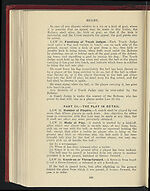1936-37
(457)
Download files
Complete book:
Individual page:
Thumbnail gallery: Grid view | List view

I
1r
RUGBY.
such player to remove the same and not allow him to take further
part in the match until after such removal.
He must not allow anyone but the players* on to the playing
enclosure during a match, except with his permission. .
He must not allow any player to leave the playing enclosure
without his permission, which should only be granted in special
circumstances.
N
OTE.
—Any player who, through injury or any other cause, has
to retire during a match, shall not resume playing in
that match until he has obtained the permission of the
Referee.
The Referee must carry a whistle. The whistle, when blown,
stops the match for the time being. The Referee shall blow it
only to indicate :—
(a) A fair-catch (even though he has blown for a knock-on or
throw-forward).
(b) Player hurt (as soon afterwards as the ball has become dead
and subject to resumption of play in not more than three
minutes).
(c) Danger, when continuation of play would be dangerous.
N
OTE.
—If the tackled player played in the proper spirit and at
once fairly released the ball, very few cases of danger
could arise, but by holding on for a short time danger
may arise. In such cases a Referee should award a
penalty.
(d) That the ball or player carrying it has touched him.
(e) Half-time or no-side, as soon as the ball has become dead,
except as the result of a try, a penalty kick, or a free kick,
when in each case he shall allow play to proceed until the
ball next becomes dead.
(fl
A goal.
(g) That the ball has gone into touch-in-goal.
(h) A breach of Law or irregularity of play, unless the non-
offending team gain an advantage.
(i) That he is awarding a penalty.
(j) Foul play or misconduct.
(k) That a stoppage is necessary for any other reason.
The Referee shall not blow his whistle:—
(1) Simply because a player is tackled.
(m) When an irregularity occurs from which the non-offending
team gains an advantage. (Subject to Laws 21, 22, 23, 24
and 27.)
N
OTE.
—A Referee should see that an advantage (generally
meaning " territorial advantage ") is actually gained by
the non-offending team, failing which, he should whistle
for the offence. An
Opportunity
of gaining an
advantage is not sufficient.
435
1r
RUGBY.
such player to remove the same and not allow him to take further
part in the match until after such removal.
He must not allow anyone but the players* on to the playing
enclosure during a match, except with his permission. .
He must not allow any player to leave the playing enclosure
without his permission, which should only be granted in special
circumstances.
N
OTE.
—Any player who, through injury or any other cause, has
to retire during a match, shall not resume playing in
that match until he has obtained the permission of the
Referee.
The Referee must carry a whistle. The whistle, when blown,
stops the match for the time being. The Referee shall blow it
only to indicate :—
(a) A fair-catch (even though he has blown for a knock-on or
throw-forward).
(b) Player hurt (as soon afterwards as the ball has become dead
and subject to resumption of play in not more than three
minutes).
(c) Danger, when continuation of play would be dangerous.
N
OTE.
—If the tackled player played in the proper spirit and at
once fairly released the ball, very few cases of danger
could arise, but by holding on for a short time danger
may arise. In such cases a Referee should award a
penalty.
(d) That the ball or player carrying it has touched him.
(e) Half-time or no-side, as soon as the ball has become dead,
except as the result of a try, a penalty kick, or a free kick,
when in each case he shall allow play to proceed until the
ball next becomes dead.
(fl
A goal.
(g) That the ball has gone into touch-in-goal.
(h) A breach of Law or irregularity of play, unless the non-
offending team gain an advantage.
(i) That he is awarding a penalty.
(j) Foul play or misconduct.
(k) That a stoppage is necessary for any other reason.
The Referee shall not blow his whistle:—
(1) Simply because a player is tackled.
(m) When an irregularity occurs from which the non-offending
team gains an advantage. (Subject to Laws 21, 22, 23, 24
and 27.)
N
OTE.
—A Referee should see that an advantage (generally
meaning " territorial advantage ") is actually gained by
the non-offending team, failing which, he should whistle
for the offence. An
Opportunity
of gaining an
advantage is not sufficient.
435
Set display mode to:
![]() Universal Viewer |
Universal Viewer | ![]() Mirador |
Large image | Transcription
Mirador |
Large image | Transcription
| Games and sports in the army > 1936-37 > (457) |
|---|
| Permanent URL | https://digital.nls.uk/248723879 |
|---|
| Description | 'Games and Sports in the Army' was an annual publication produced by the British War Office between the 1930s and 1960s. This included the Second World War. It outlines the rules and regulations for games and sports played by members of the armed forces. It features names and photographs of team members, and examples of contemporary advertising. |
|---|---|
| Shelfmark | GWB.52 |

